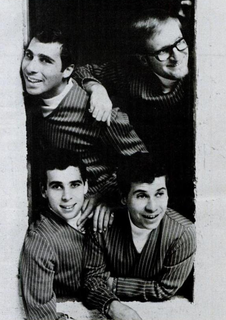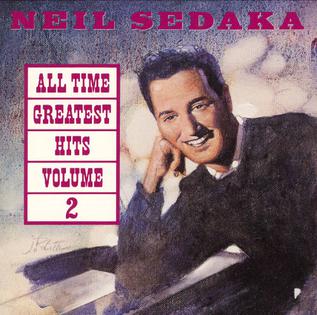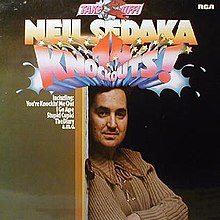
Neil Sedaka is an American pop singer, pianist, composer and record producer. Since his music career began in 1957 as a short-lived founding member of the Tokens, he has sold millions of records as a performer and has written or co-written over 500 songs for himself and others, collaborating mostly with lyricists Howard "Howie" Greenfield and Phil Cody.

The Tokens were an American male doo-wop-style vocal group and record production company group from Brooklyn, New York. They are known best for their chart-topping 1961 single, "The Lion Sleeps Tonight".
Fallin' is a song written by Neil Sedaka and Howard Greenfield, that was recorded by Connie Francis on 2 September 1958 at Metropolitan Studio (NYC) in a session produced by Morton "Morty" Kraft who also conducted.
Rock with Neil Sedaka or just Neil Sedaka is the first major solo album of Neil Sedaka released in 1959 after two 1958 albums under the titles Neil Sedaka and The Tokens and Neil Sedaka and The Tokens and Coins. The album was released by RCA Victor and was produced by Al Nevins. The album contains 12 songs, all of them co-written by Sedaka and his friend Howard Greenfield. Two of the songs became successful singles for Sedaka from the album, namely "The Diary", his debut single that was a hit, reaching No. 14 on the US Billboard charts, and "I Go Ape", a single that was relatively successful in the United States reaching No. 42, but did far better in the UK Singles Chart, making it up to No. 9 and his debut single in the United Kingdom.

Circulate is the second solo album of Neil Sedaka after his 1959 debut solo album Rock with Sedaka. Circulate was released in 1961 by RCA Victor and was produced by Al Nevins and Don Kirshner. Except for the title song "Circulate" and "I Found My World In You", the whole album contains covers of the 1930s, 1940s and 1950s songs as interpreted by Sedaka. Two of the songs were re-issued as B-sides of other hits: "I Found My World In You" was the B-side of "Sweet Little You" later in 1961, and "Circulate" was the B-side of "Alice In Wonderland" in 1963. Sedaka later recorded Italian-language versions of "Smile" and "All the Way"
"I Go Ape" is the second single by Neil Sedaka, immediately following his success with the debut single "The Diary", and was written by Sedaka himself and Howard Greenfield. It was released in 1958, and also appears on Sedaka's 1959 debut solo album Rock with Sedaka. The rock and roll novelty song, which name-checks various primates, was performed in the boogie-woogie style of Jerry Lee Lewis.

Neil Sedaka Sings Little Devil and His Other Hits is a solo album by Neil Sedaka released in 1961 immediately after the cover versions of earlier hits in Circulate.

Neil Sedaka Sings His Greatest Hits is a 1963 compilation album of twelve of the most popular hits of Neil Sedaka's tenure with RCA Victor.
"Crying My Heart Out for You" was the third single of Neil Sedaka immediately following the success of his debut single "The Diary" and follow-up single "I Go Ape." The hit written by Neil Sedaka was released in 1959 reaching No. 111 on the US Billboard Chart. It was more successful in Italy, where the record hit No. 6. The record's commercial failure nearly prompted RCA Records to drop Sedaka from its roster; after Sedaka begged the company for a second chance, he took the opportunity to analyze the popular music of the day and wrote "Oh! Carol," beginning a five-year string of hit singles that would continue until the British Invasion.
The following is a comprehensive discography of Neil Sedaka, the American singer.

Stairway to Heaven: The Best of Neil Sedaka is a 2004 compilation CD album containing the works of American pop star Neil Sedaka. The songs on this album come from the period of 1959-1964, when Sedaka was affiliated with RCA Victor records. This CD was issued by BMG Special Markets.

Neil Sedaka's Greatest Hits is a compilation album containing the works of the American pop singer Neil Sedaka. It was originally released in the UK and throughout Western Europe in 1980 on the RCA International label. It was issued again on CD ten years later in 1990. The album contains songs that Neil Sedaka recorded while with RCA Records from 1959 to 1963.

"Next Door to an Angel" is a rock and pop song written by Neil Sedaka and Howard Greenfield and recorded by Neil Sedaka in 1962. It was issued by RCA Victor Records. It reached No. 5 on the Billboard Hot 100 in late 1962. "Next Door to an Angel" also went to No. 19 on the Hot R&B Singles chart. It was Sedaka's last appearance on the American Top 10 until "Laughter in the Rain" in late 1974.

Let's Go Steady Again is a compilation album containing the works of American pop singer Neil Sedaka. It was released in the US in 1976 on the RCA Victor label. It contains some of Sedaka's lesser-known hits that he recorded during his years with RCA from 1959-1966.

Sunny is a 1979 compilation album containing the works of American pop singer Neil Sedaka. It features some of Sedaka's works from 1958–1964, during his affiliation with the RCA studios. It was released in the UK and throughout Western Europe on the RCA Camden label.

Neil Sedaka: All Time Greatest Hits, Volume 2 is a compilation album containing the works of American pop singer Neil Sedaka. The songs featured are some of Sedaka's lesser-known songs from his days with RCA Victor from 1958–1966, songs that were not included on the 1988 album Neil Sedaka: All Time Greatest Hits. The album was released in 1991 by RCA Records.

Neil Sedaka: The '50s and '60s is a compilation album containing some of the works of the American rock-and-pop singer Neil Sedaka. It features some songs he recorded during the period from 1959 to 1966, when he was under contract to RCA Victor Records. The album was released in 1977 on the RCA Victor label.

Love Songs is a 2005 compilation album containing the works of the American pop singer Neil Sedaka. It contains many of Sedaka's works from his years with RCA Victor from 1959-1964. Some of the tracks on the CD had never before been released. "Love Songs" was jointly issued by RCA and Legacy Records.

The Very Best of Neil Sedaka is a 2001 compilation album issued by RCA Records as part of their commemorative "100th Anniversary" series of albums celebrating their biggest stars. The album features some of Sedaka's best-known hits during his days with RCA, recorded from 1958 to 1963.

"Do You Really Love Me Too" is a song written by Mark Barkan and Ben Raleigh and first released by American pop singer Barbara Chandler as the flip side to "I Live to Love" in October 1963. Originally called "Fool's Errand", it was renamed "Do You Really Love Me Too" on the UK release of the single in December 1963.














